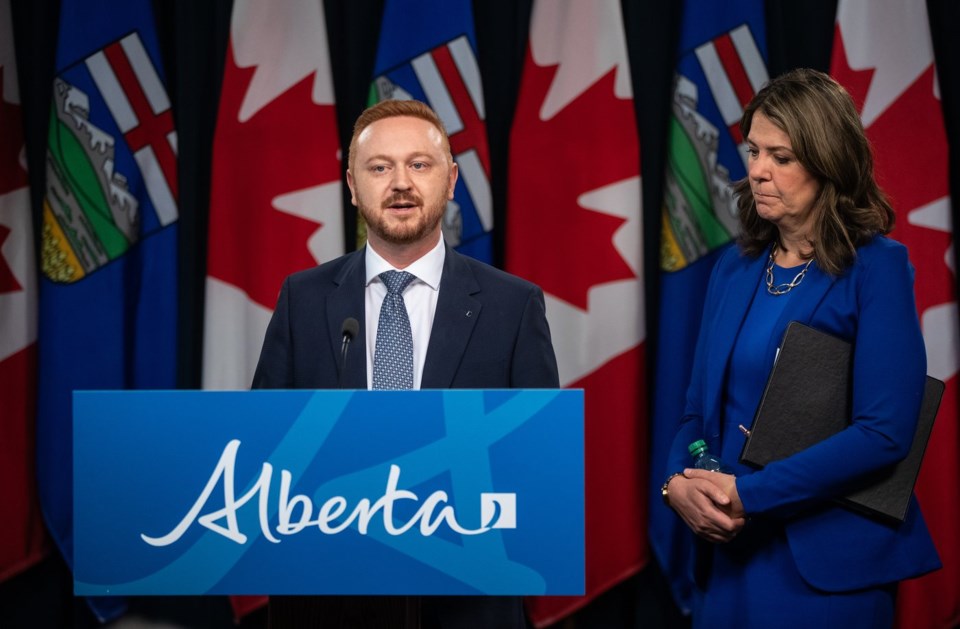CALGARY — Alberta is appealing a temporary injunction of a law banning doctors from providing gender-affirming care to youth.
A judge granted the injunction in June, ruling the provincial law raises serious Charter issues that need to be hashed out in an ongoing court challenge of the legislation.
Court of King's Bench Justice Allison Kuntz said the law is likely to cause irreparable harm to gender-diverse youth and she didn't find the contrary evidence submitted by the province to be overwhelming.
The government, in an appeal filed to the Calgary court last month, argues the injunction was premature, since it wasn't fully in effect.
It also claims the judge made a mistake and "mixed fact and law" in deciding the legislation would cause irreparable harm.
Justice Minister Mickey Amery's press secretary, Heather Jenkins, said the law was passed to protect children from making potentially irreversible decisions about their bodies.
"Alberta’s government will continue to vigorously defend our position in court," she said in an email Friday.
Egale Canada, one of the groups challenging the law along with five transgender youth, says it respects the province's right to appeal but believes the judge made the right decision.
"The Court of King’s Bench, relying on extensive expert testimony and evidence, affirmed what we have long argued — that denying gender-affirming care causes irreparable harm," Egale's legal director, Bennett Jensen, said in an email.
"The context of this case remains clear: the government is interfering in the relationship between doctors and patients by seeking to ban medically necessary, evidence-based care for an already marginalized group of youth."
The law bans doctors from providing treatment such as puberty blockers and hormone therapy to those under 16.
Kuntz wrote in her decision that denying treatment could cause youth emotional and psychological harm and expose them to permanent physical changes that don't match their gender identity.
She also said the ban would reinforce the discrimination and prejudice they already experience.
"Intentionally or not, the ban will signal that there is something wrong with or suspect about having a gender identity that is different than the sex you were assigned at birth," the judge wrote.
The province had argued against the injunction, saying claims the law would harm youth were speculative because the ban hadn't been enforced yet.
The government also said any psychological harm would be a result of puberty, though the judge largely rebuffed that argument.
The Canadian Medical Association and three Alberta-based doctors are also challenging the law's constitutionality in a separate case. The doctors argue the law violates their Charter right to freedom of conscience.
The law came from a trio of bills affecting transgender people that Premier Danielle Smith's United Conservative Party government passed last year.
The other pieces of legislation ban transgender women from competing in women's sports and require children under 16 have parental consent to change their names or pronouns at school.
Parents are also required to opt in their children for school lessons on sexuality, sexual orientation and gender identity.
Alberta's law followed Saskatchewan, which passed its own law in 2023 that requires parental consent for students under 16 who want to change their names or pronouns. That government invoked the Charter's notwithstanding clause in response to a court challenge launched in part by Egale Canada as well.
Despite Saskatchewan's use of the notwithstanding clause, a judge ruled that a challenge could continue on the legislation, though that decision was appealed by the province.
A decision on Saskatchewan's appeal is expected Monday.
Smith has said invoking the notwithstanding clause isn't off the table to ensure Alberta's gender-affirming care ban is enforced.
This report by The Canadian Press was first published Aug. 8, 2025.
— By Jack Farrell in Edmonton
The Canadian Press



